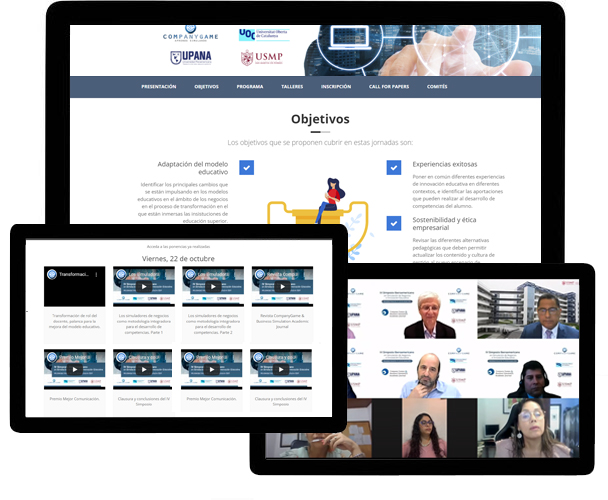Educational innovation
Application of key principles in educational innovation models: flipped classroom, educational technology, skills development or professional practices.


The Ibero-American Symposium on Business Simulation and Educational Innovation seeks to share reflections and experiences of educational innovation carried out from different higher education institutions, with the purpose of facilitating the transformation process of other related institutions. The implementation of business simulators are good benchmarks for institutional transformation processes, although the process must be broader in order to respond to all the requirements of the environment.
The Symposium allows sharing challenges with professionals from different centers and fields of study, as well as generating lines of collaboration and research.
The objectives that are proposed to be covered in these sessions are:

Identify the main changes that are being promoted in educational models in the field of business in the transformation process in which higher education insistences are immersed.
Update the skills profile required by the current and future labor market, with the aim of improving the employability of students.
Review the pedagogical learning methodologies to achieve the goals identified in the development of students' skills.
Identify opportunities for action to improve the teaching capacity of teachers, and promote a change in the role they should play within the framework of the new educational model.
Share different experiences of educational innovation in different contexts, and identify the contributions they can make to the development of student skills.
Review the different pedagogical alternatives that should allow updating the management content and culture to the new scenario of sustainability and business ethics demanded by society.
Review the initiatives that educational institutions are adopting to promote skills related to the entrepreneurship of new businesses.
Generate links between all participants to start lines of collaboration and/or research.
The link between Business Simulation and Educational Innovation is direct for various reasons.
Application of key principles in educational innovation models: flipped classroom, educational technology, skills development or professional practices.
Overcoming the limitations of traditional educational models through the practical integration of knowledge from various areas.
Simulation exercises are well suited to both face-to-face and virtual environments. Thus, they can be an easily applied ingredient in the hybrid models that will prevail in the future.
Collaborative and team work, effective communication, autonomous learning, negotiation, problem solving, etc...
According to current trends, the principles to consider when reviewing educational models are:
There should be a better link between the requirements of the labor market and the objective competency profile defined by the institution. Educational institutions must more explicitly assume the commitment of said competency profile with the labor market, and with society.
Educational institutions must have robust educational models based on the objective competency profile, which adequately align the subject curricula, the pedagogical methodologies, the required profiles of the teachers and the support technologies for the educational model.
The teaching-learning processes must have different levels of personalization, admitting the different learning profiles and skill levels of the students. This particularization must guarantee greater reliability in the achievement of the students' objectives, while at the same time reaching the required competency profile.
The institution must evaluate the methodologies that must be incorporated into its educational programs to favor the development of the competence profile of the students. The teacher's masterful presentation will lose weight as a reference methodology. The inverted class, learning based on problems or challenges, learning based on simulation, among other methodologies, must have a continuous presence throughout the academic program.
Collaborative work will gain relevance in the student's learning process. Collaborative work is of great value in the development of social skills, and provides the necessary social and emotional component in the learning process.
The teacher's competence profile may not be based exclusively on the technical profile. The teacher's profile should resemble the student's objective competency profile, of course with respect to her soft skills. Additionally, the teacher must have robust skills as an educator, advisor and developer of skills.
Educational models must resolve the face-to-face-virtual dilemma. They will have to support different combinations of hybridization and different modes of virtuality. Educational models must admit flexibility, without being limited in the other principles mentioned. The technological and pedagogical resources must admit this duality.
The development of professional skills requires rigorous work in the consolidation of technical learning, but the educational models must extend the time dedicated to reinforcing the integrity and transversality of knowledge. This transversality will be what will facilitate the development of the professional skills required by the labor market.
The classic tutored model must be complemented with a wide variety of complementary resources based on support technologies that allow the customization and flexibility of the programs. Institutions will have to make a significant effort to develop these resources, which will be fundamental in order to have a unique proposal for the market. Teachers will need to be fully integrated into this approach..
Assessment models should be transferred from technical knowledge to skills. The evaluation of competencies will require adequate resources and methodologies, in addition to intense training of teachers. Teachers should spend more time evaluating, correcting and developing students. The availability of complementary resources, the lower weight of knowledge transfer, the reinforcement of collaborative work, and the technology that supports the teacher, should free up time for the teacher to dedicate to this task.
Business management models have traditionally been biased towards financial parameters, so business management models are dominated by mathematical logic. Faced with this dynamic, social reality demands a greater domain of values, social logic and critical thinking. The values linked to sustainability, understood in a broad sense, must be incorporated as a backbone of the business management model.